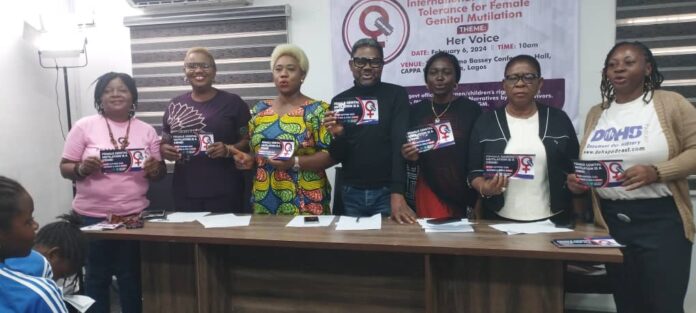By Ishaya Ibrahim
At the age of 12, Fatima Daudu, now a housewife in her 30s, recalled with pain how her father made her go through the trauma of circumcision twice within hours.
Her mother had vehemently opposed the idea of circumcising Fatima when the father broached the subject earlier. She threatened to walk out of the marriage if her daughter was allowed to go through the barbaric practice. But Fatima’s father was adamant, and her mum reacted by quitting the more than 12-year-old marriage.
On the day of the circumcision, a haggard looking old woman was fetched from a remote community more than four kilometres away from their home in the GRA area of Ikeja.
With only a razor as her tool, the old woman ordered hefty looking men to pin Fatima to the ground to enable her carry out the now illegal act.
Despite spending more than 15 minutes fiddling with her razor on Fatima’s private part, the old woman declared the act unsuccessful. She then ordered a second repair circumcision.
This time, the 12-year-old Fatima could no longer stand the physical and psychological torture. As a result, she summoned all her strength within her to destablise the three hefty men holding her, plus the old woman. In the process, the razor sliced a large chunk of Fatima’s thigh, leading to profuse bleeding. In the confusion that ensued, all the three men and the old woman ran away. Fatima herself ran to her father’s boss home. (Her father was a security guard at a residential home at the time.)
“I ran to my dad’s boss’ place. I told him to see what happened me. My dad’s boss then rushed me to a hospital. At the hospital, the health workers stitched the cut and gave me drugs that eased the pain. So, I became fine,” Fatima recalled.
Her father’s boss however told Fatima’s father that his daughter had died as a result of the circumcision. It is not clear why he did that. But that bad news caused a tragedy.
“When my father’s boss met my dad, he told him that I was dead. My father became scared. That’s how he ran away to Borno State. Few days after, he died from the trauma of thinking that I was dead,” she said.
Fatima, who is in her 30s now, says she has stopped giving birth because all four children she had came with delayed labour. “It was taking me two days in labour for my four children. So, I decided that I would not have any more children again,” she said.
Female Genital Mutilation (FGM) has been proven to cause harm to women in the form of prolonged labour, diseases, infections and lack of sexual pleasure.
Despite its proven harm, some communities still carry out the act in Nigeria.
For some, it is just to preserve the tradition handed to them by their forebears. For others, it is a thing of pride that their daughters have experienced it. But for the vast majority who practice it, it is to stop a woman from being promiscuous (a false claim).
A housewife, Folashade Onikoyi said her father told her the purpose of FGM was to prove her virgin to her husband on the conjugal night. “My father said it will confirm that I am a virgin on the night that I would meet my husband. And that people will be happy and there will be celebration.”
Many young women have lost their lives during FGM. A mother of three, Bridget Simon was circumcised when she was 12 years old. But when it was the turn of her younger sister to be circumcised, she bled to death.”
February 6 of every year has being set aside by the United Nations as the International Day of zero tolerance for female genital mutilation.
In Lagos, a non-governmental organization, CEE-HOPE, in collaboration with Hearts 100, held a one day sensitization workshop to drum opposition against the continuation of the practice in some parts of the country.
Founder of Hearts100, Anne Ruffer said that more needs to be done around sexual and gender based violence (SGBV) by creating awareness about the issues, pressuring lawmakers to activate the relevant laws to protect women and girls.
She wants more to be done also for the protection of women threatened by SGBV via provision of shelter as well as economic empowerment via skills training, business grants and others so that they can be independent, rise above abuse and go on to maximize their potentials.
Other speakers at the event urged for zero tolerance of FGM, which according to CEE-HOPE executive director, Betty Abah, is not only a human right violation, but a crime.
Founder and Executive Director of Women’s Rights and Health Project (WRAHP), Bose Ironsi, says FGM endangers a woman’s reproductive ability.
A development expert and pastor, Kingsley Egbulem, says those involved in FGM are telling God, the maker of humans that he made a mistake putting clitoris in a woman, hence their decision to remove it.
Women rights activist, Margaret Onah, said FGM is still prevalent in Nigeria, especially Osun state. She said women in the village where ace musician, David Adeleke, popularly known as Davido hails from, vowed to continue with the practice.
She then pleaded with those who may know Davido to urge him to intervene by being a voice against FGM.
Other speakers at the event, including Olalade Ajayi, Yinka Kenny and Anthonia Ojenagbon, also criticised the practice.













